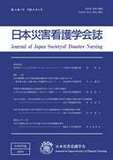Japanese
English
- 有料閲覧
- Abstract 文献概要
- 参考文献 Reference
- サイト内被引用 Cited by
要約
本研究の目的は、災害復興期における被災独居高齢者の生活の実態を明らかにし、適切な支援のあり方を提言することにある。研究協力者は、能登半島地震において被災後もその土地に独りで暮らしている65歳以上の5人の高齢者である。研究協力者に半構造化個人面接を行い、修正版グラウンデッド・セオリー・アプローチ(M-GTA)を用いて分析を行った。結果、災害復興期における被災独居高齢者は、【家屋の修理が一段落した頃から感じる心身の不調】を抱えながらも、【伝統と文化に裏付けられた誇りと自負が支え】となり、【地震の後遺症を抱えながらも家を修復する責務に突き動かされ】て生活していることが明らかとなった。災害復興期においては、被災独居高齢者の健康問題が顕となる前に、個の状況に応じた多様な支援が重要である。そのためには、被災独居高齢者の伝統的・文化的背景を知ることが必要である。
Purpose:To examine the living conditions of elderly citizens living alone during disaster recovery periods and propose suitable approaches for related support.
Method: Semi-structured interviews were conducted and the results were analyzed using M-GTA for five elderly citizens (aged ≥ 65 years) who were affected by the Noto Peninsula earthquake and were living alone in the disaster zone.
Results: The subjects suffered emotional and physical sickness during home reparation. However, they were felt to have a strong sense of responsibility for repairing damaged houses after the disaster, and this sense of duty was sustained by pride and self-confidence based on tradition and culture.
Conclusion: During disaster recovery periods, it is crucial to provide various kinds of support in response to individual situations before health issues among senior citizens living alone in disaster-affected areas become apparent. To this end,it is essential to know about the traditions and culture of such individuals.
Copyright © 2014, Japan Society of Disaster Nursing All rights reserved.


